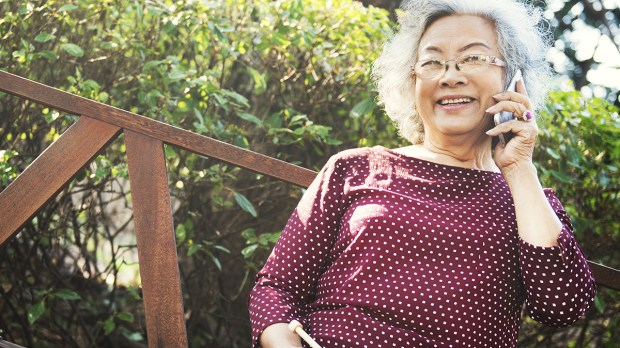When Joyce’s grandmother moved in with her family, there was one thing that came as a big surprise to everyone: grandma was addicted to her smart phone. She brought it to the table for meals, she carried it around the house with her, she spent hours on it even when there were other things she was supposed to be doing.
Joyce’s family wasn’t sure how to deal with it. When they raised the issue, the 79 year-old grandmother reacted defensively and denied she had a problem. “I need to hear the phone when someone calls me!” she told her family. But that seemed like an excuse since she didn’t get many calls and those she received were never urgent.
Most of us don’t think much about seniors being addicted to screens — it’s the younger generations who are supposed to have that problem. And they certainly seem to: According to the Pew Research Center, 44% of 18- to 49-year-olds report that they are online almost constantly.
But this rise in screen time coincides with significant growth in the adoption of Digital technology by older adults, too, according to Pew.
In 2000, 14% of those ages 65 and older were internet users; now 73% are. And while smartphone ownership was uncommon at all ages around the turn of the 21st century, now about half (53%) of people 65 and older are smartphone owners.
Seniors can be particularly vulnerable to the effects of digital technology. They are sometimes lonely and may be more isolated. The pandemic has made this much worse. Seniors may also have poor self-awareness when it comes to their lifestyle habits, and decreased cognitive abilities which can prevent them from placing appropriate boundaries around screen usage.
No matter the reasons, the bottom line is that seniors can get addicted to their screens, too. And when they do, it’s not always easy to know whether or how to help. Family members may be left wondering whether they should encourage them to spend less time on screens, or to just let it go.
If you know a senior who seems addicted to his or her phone or any other digital device, here are a few things to consider as you discern whether to say something about it or not…
- If an elderly loved one lives in or visits your home, make sure they’re aware that certain house rules pertain to everyone. So if phones are supposed to be off the table during meal times, that means grandma doesn’t bring her phone to the table. If phones are supposed to be turned off during family game night, that includes grandpa.
- Encourage the seniors you know to place time trackers on their phones and devices and to check in at the end of the day or week to see how long they’re spending on them. Sometimes just seeing that data can inspire some change.
- Share information with your senior family members about studies that show the association between high levels of smart phone and internet use with increased levels of depression and anxiety.
- Encourage the seniors you know to be more physically active, to have real-time conversation with others more often, to read books or magazines, and to do other activities that get them away from their devices.
- Invite your senior loved ones to think about their time as a precious gift. They have a limited amount of it left — do they really want to be spend so much of it on their devices? Maybe, but maybe not.
- Model the behavior you want your loved ones to have. Practice what you preach. Be aware of your own habits and tendencies and openly share your struggles and strategies related to your digital devices.
- Lastly, don’t forget the positives of digital technology — and recommend that the seniors you love play to those strengths. Smart phones and other devices do help a lot of older people feel more connected and informed. If someone is infirm or limited in their abilities to get out and interact with others, such devices can be a lifeline. There are games that are good for the brain, and information online that motivates and inspires. If seniors are going to be on their smart phones, encourage them to use their devices in ways that are more helpful and less harmful.
These are good practices for all of us, no matter what our age. If we build good habits when we’re younger, we’ll be a lot better off when we reach old age ourselves.



